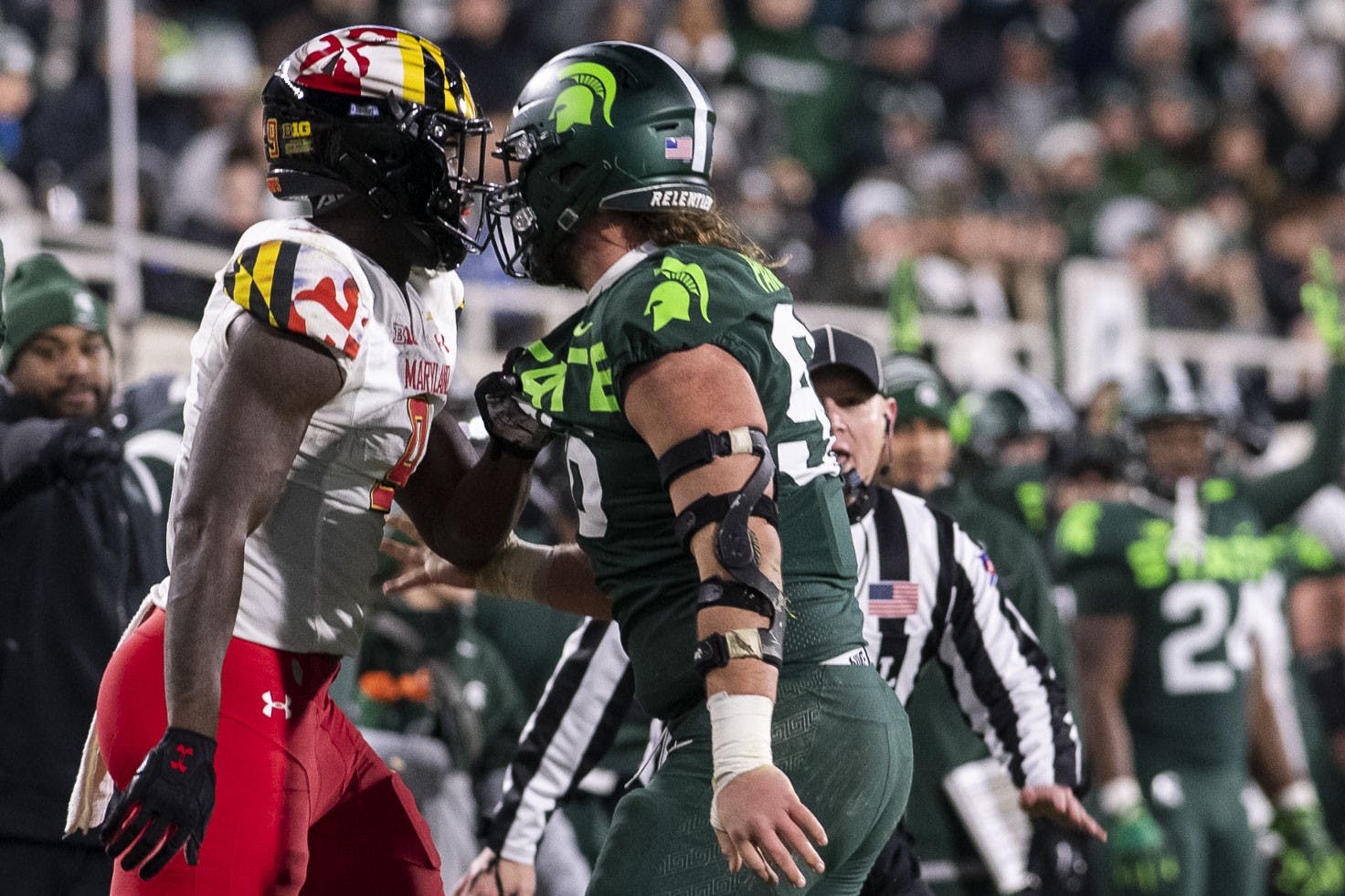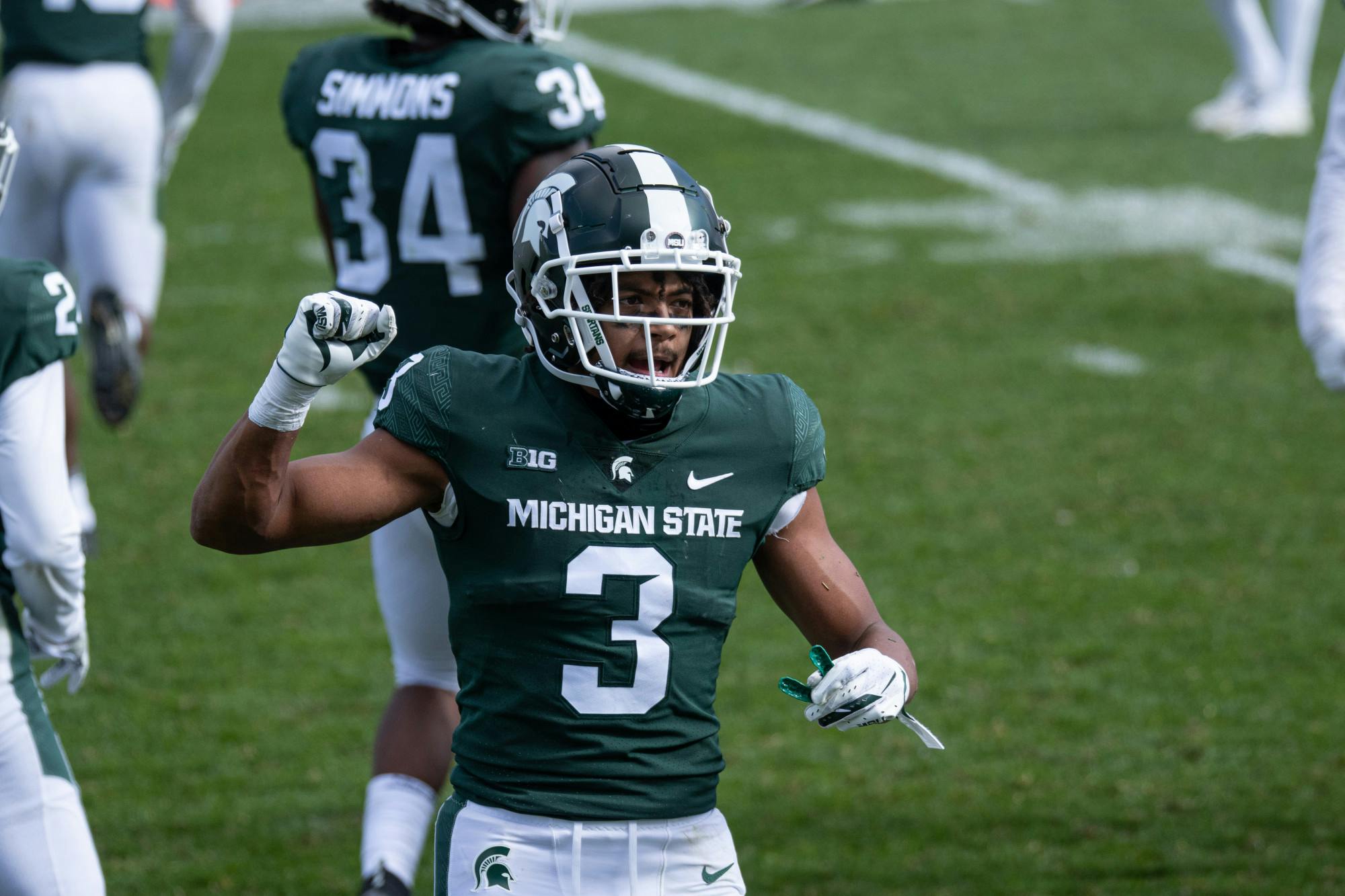Earlier this month, Michigan voters elected Democrats Dennis Denno and Renee Knake Jefferson to the Michigan State University Board of Trustees. They secured their spots on the ballot at April’s Democratic endorsement convention and essentially stopped campaigning after that event, according to their most recent campaign finance filings.
Following the convention, Denno spent nothing on his campaign and Jefferson’s only expenditure was a $10,000 billboard purchase. November’s losers, Mike Balow and Travis Menge spent $16,941 and $27,549 after their convention, respectively.
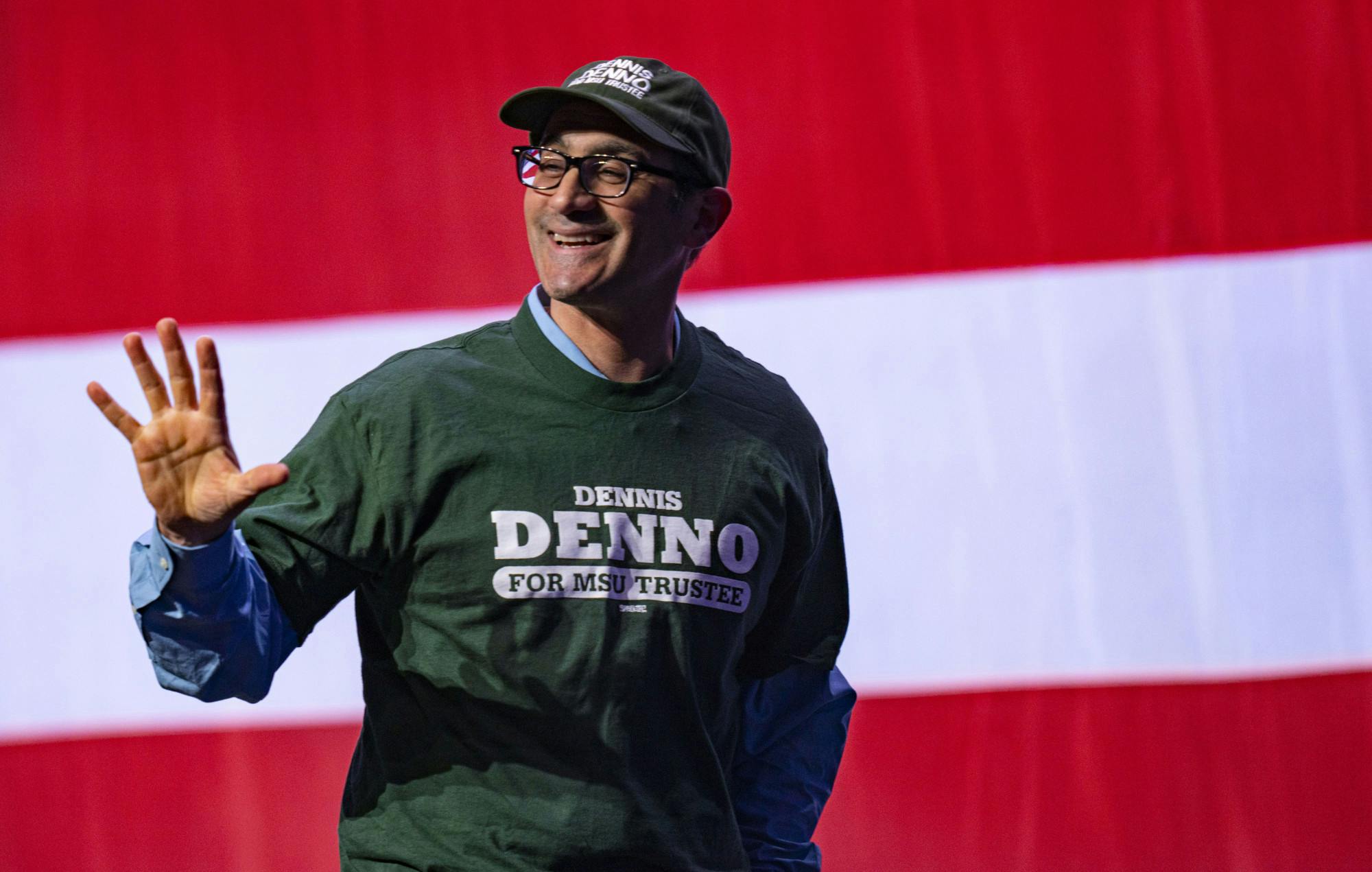
When asked about his filings, Denno confirmed he had stopped campaigning for the trustee position after receiving the nomination.
“As far as campaigning, I really didn't raise a lot of money, I really didn't do a lot of events,” Denno said. “I spent a lot of time volunteering for the yes-on-proposal-three campaign, and just focusing on trying to help other candidates.”
With Denno donating $5,000 of his campaign funds to the state Democratic party in the month before the election, his finances support this.
More broadly, Denno credits overwhelming Democratic turnout for his win.
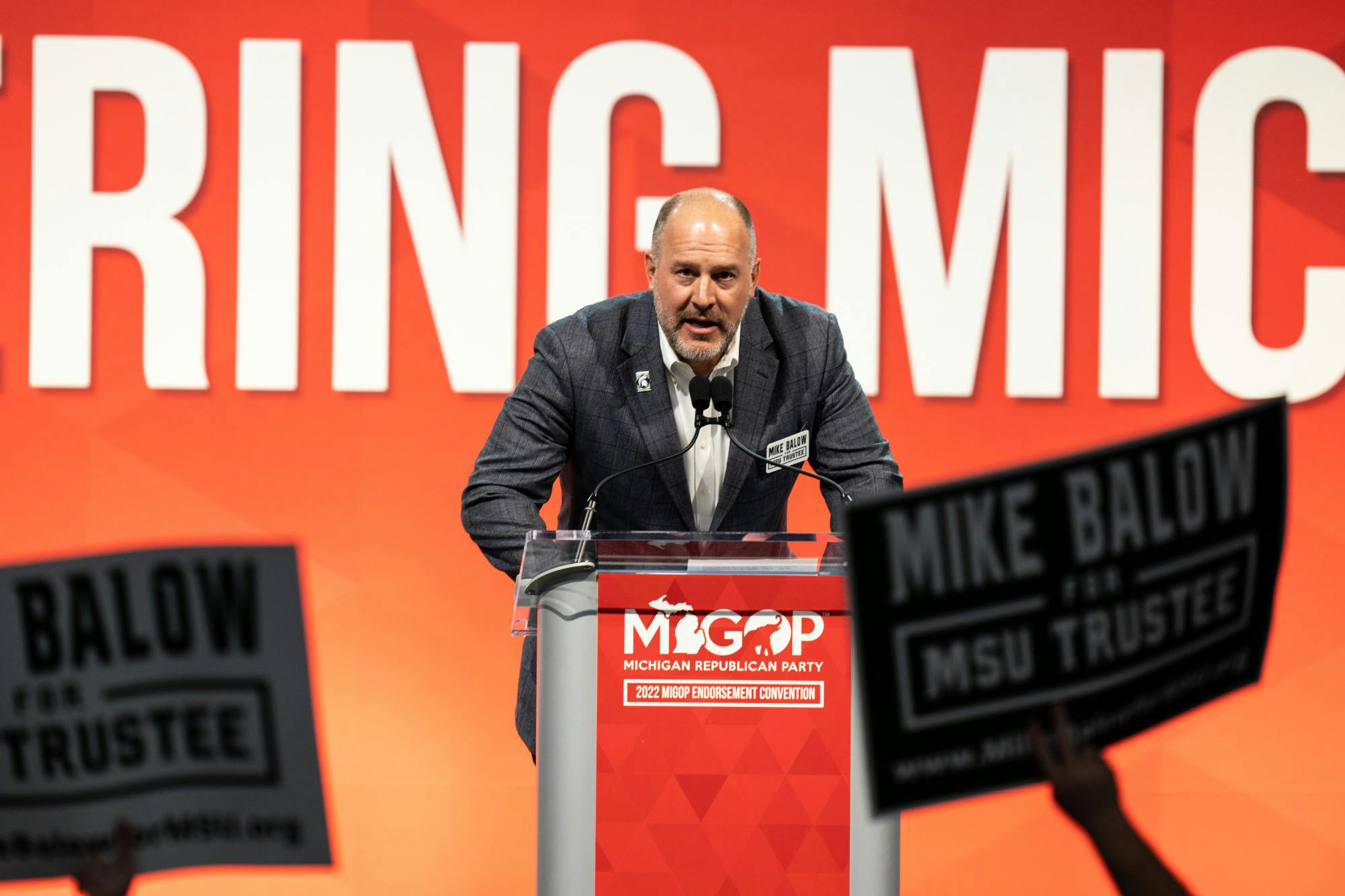
MSU parent Mike Balow as he campaigns for the Board of Trustees at the MI GOP Endorsement Conference on April 23, 2022.
“I mean, that's the issue with these education positions,” Denno said. “It's all about turnout. It's all about the top of the ticket."
On whether statewide elections are creating the best board for MSU, Denno said electoral and gubernatorial appointment systems both have their flaws, but voters should be assured the party had chosen carefully and he is “quite qualified to be on the board.”
In an email to The State News, Jefferson wrote, "I don't have any comment regarding the spending of candidates in the race."
Balow said the two parties simply approached the race differently.
“I think what you're seeing is two different approaches,” Balow said, “And I'll preface this by saying I'm not being critical of how the Democrats approached it.”
He said while he and Menge had their party’s support at the convention, in the months that followed they were left to work independently which led to them to do more direct campaigning with voters on MSU issues.
Denno and Jefferson secured their party’s support and then stopped campaigning on MSU issues while focusing instead on supporting top-of-the-ticket Democrats with donations and volunteering.
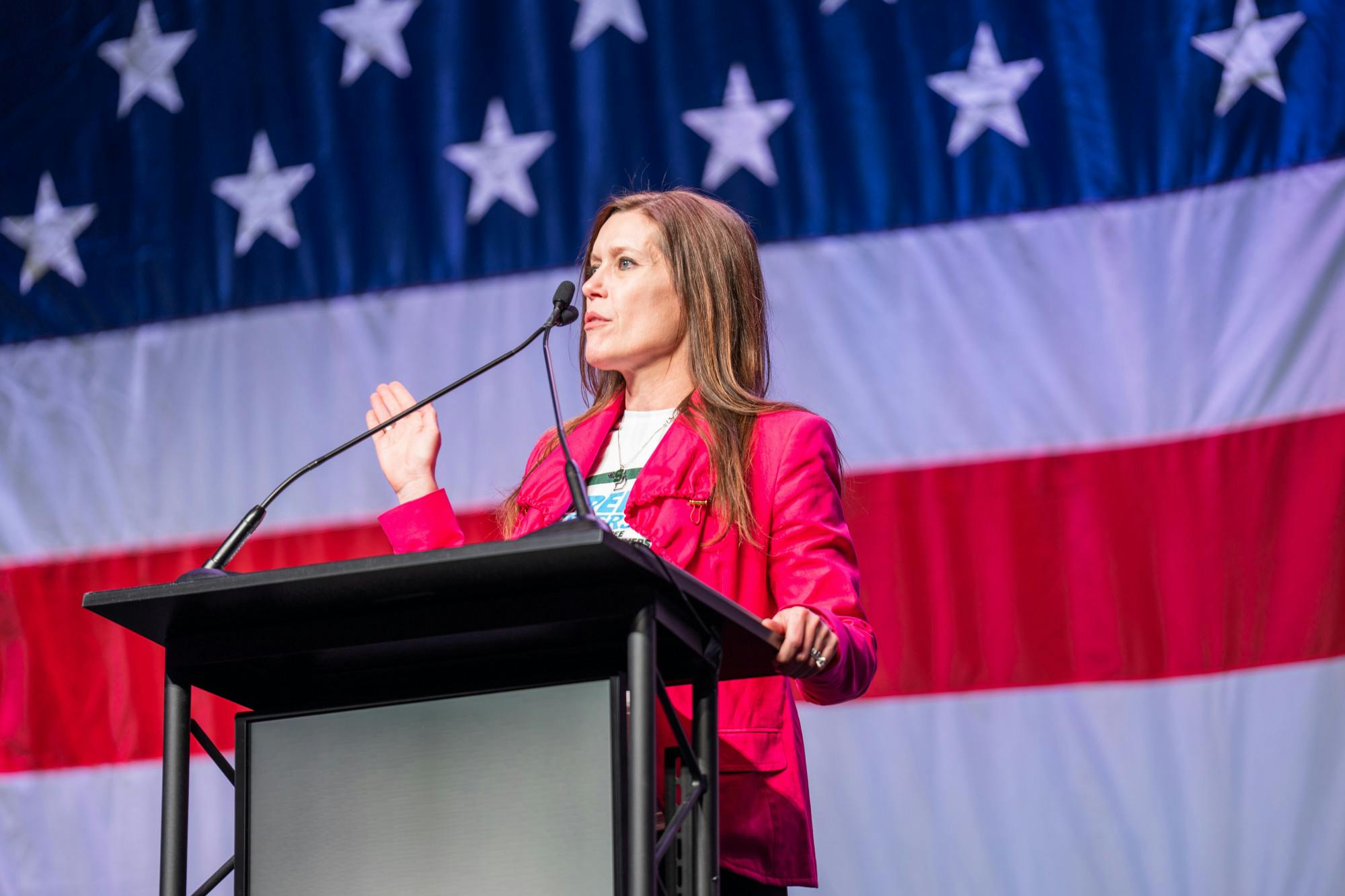
Trustee Renee Knake Jefferson speaks at the Michigan Democratic Party Spring Endorsement Convention in Detroit on April 9, 2022. Jefferson was appointed to a partial term by Gov. Gretchen Whitmer in 2019 and is now running for a full term.
This year’s election results – which have still not been certified by the board of state canvassers – suggest that despite being overpowered by the overall Democratic turnout, Balow and Menge’s direct campaigning may have had an effect on the race.
Support student media! Please consider donating to The State News and help fund the future of journalism.
The current members of the board were elected in years where the results of the trustee races varied very slightly from what happened at the top of the ticket, by just 2.8% on average. This year, the Republican candidates were neck and neck with the Democrats, outperforming the gubernatorial Republican, Tudor Dixon, by 8.63%.
The number of voters who filled out the trustee section of their ballot varied as well. On average, a current trustee was elected in a race that received 85.45% of the turnout compared to the gubernatorial or presidential race at the top of the ballot. This year, 89.9% of those voting in the gubernatorial race also voted in the MSU trustee race – a higher ratio than any of the current board member’s elections.
In a voicemail message to The State News, Balow said he and Menge “made it amazingly close, because we directly campaigned on things that were important to people.”
“Without that, it would have been a lot more, given the top of the ticket,” Balow said.
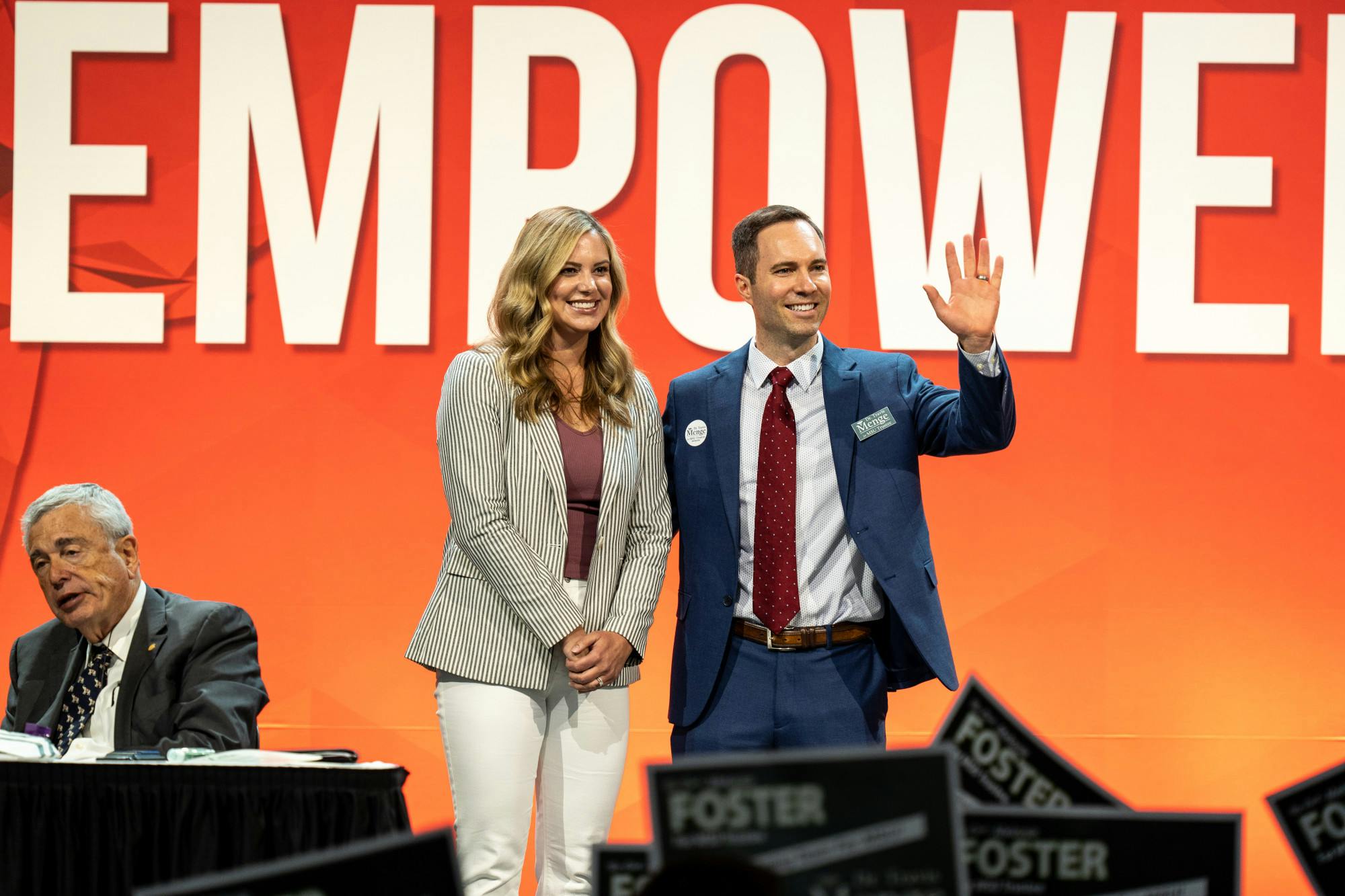
Travis Menge and his wife wave at the crowd during his campaign at the MI GOP Endorsement Conference on April 23, 2022.
This political split on spending falls in line with previous years.
Democrats currently on the board raised money from a variety of donors and unions at fundraisers and personally, but spent very little of it on their campaigns, instead opting to donate it to the state party.
Democratic board chair Dianne Byrum donated 68% of what she raised across her two successful campaigns to the state Democratic party. Democrat Brianna Scott donated 48% of her fundraising.
During her 2018 campaign, Democrat Kelly Tebay’s largest post-convention expense was $12,500 in donations to the state party; overall, Tebay spent comparatively very little on campaigning before and after the convention, excluding a $10,000 reimbursement to herself for undescribed campaign-related expenses.
Byrum, Scott and Tebay did not respond to calls or emails requesting comment on the contents of this story.
Rema Vassar is the only Democrat to break this pattern, following her nomination she spent heavily on printed materials, as well as online, billboard and social media advertising.
Like this year’s candidates, the filings of Republicans currently on the board suggest they openly campaigned with voters until the election.
Following the convention, Republican Dan Kelly spent on memberships and event access with county Republican clubs and events, as well as various campaign paraphernalia from communications consultants.
Republican Pat O’Keefe spent heavily on political consultants, and in the run-up to the election, he bought $13,965 on local TV advertisements and $5,400 in online advertising.
In 2014, Republican Melanie Foster spent heavily in the months preceding the election. She paid for campaign consults, radio, outdoor and television advertisements, as well as mailed campaign literature.
Foster attempted to run for re-election this year. But Foster lost her party’s nomination to Balow and Menge, following a letter sent to delegates written by survivors of ex-MSU doctor Larry Nassar. The letter urged them not to vote for Foster given her position on the board during MSU's handling of the abuse.
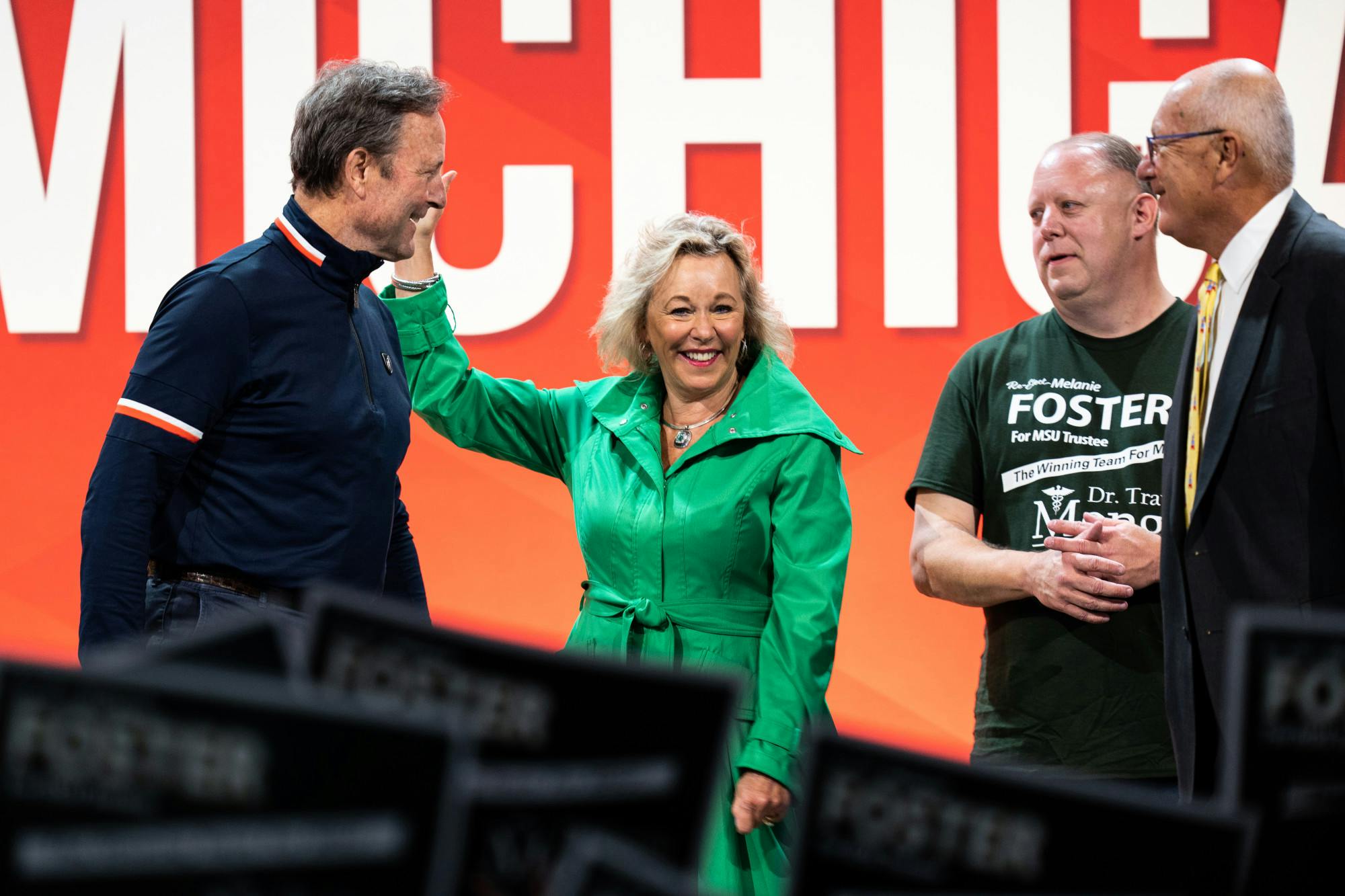
MSU Trustee Melanie Foster during her presentation at the MI GOP Endorsement Conference on April 23, 2022.
This party-line split also applies to fundraising: Democrats currently on the board all ran campaigns almost entirely funded by donors, while all Republicans gave significantly to their own campaign with two of the three being nearly entirely self-funded.
Republican Dan Kelly donated $40,000 to his own campaign, 84% of what he would raise in total. Kelly did not respond to emails or calls requesting comment on the contents of this story.
Republican Pat O’Keefe contributed $81,000 to himself over the course of his campaign, 97% of what he would raise in total. O’Keefe did not respond to calls requesting comment on the contents of this story.
In her successful campaigns, Foster made major contributions to her own campaign, but unlike her Republican peers, also employed fundraising for the majority of her funds.
Her successful 2014 campaign raised $178,662, making it the most expensive trustee campaign of any of the current trustees or candidates, and nearly double the next most expensive successful campaign. She contributed $66,273 and raised the rest from an array of individual donors.
Most of her fundraising happened in just one night. On May 1, 2014, Foster hosted an 80-person fundraiser at the Andiamo's Restaurant in Bloomfield Hills where she collected $105,740 in donations. This is the most lucrative fundraiser of any successful campaign – if it was the sole fundraising of her campaign, she would still have raised over $10,000 more than the next highest campaign.
This year, she campaigned with $22,850; $21,351 of which came from herself, while the rest was left over from her 2014 campaign.
But unlike the board, this year’s candidates didn’t follow a party-line pattern. Balow and Jefferson ran donor-funded campaigns, while Menge and Denno were self-funded.
Denno has been fundraising on and off since his first campaign for trustee in 2010. This cycle, he gave $17,133 to his own campaign, making his total contribution over 12 years $27,876 of the $34,046 he raised.
Menge contributed $73,528 to his campaign in loans from himself, about 70% of his fundraising.
Menge was unavailable for comment due to his work schedule. Though, his campaign consultant Scott Greenlee did confirm his filings and asserted that Menge spent his campaign contributions on direct campaigning with voters following the convention.
Menge and Greenlee first knew each other as doctor and patient – before retaining him as a consultant, Menge performed surgery on Greenlee’s arm.
“I tell people, not only would it be great from a policy standpoint at Michigan State, which needs the help, but I can personally tell you he's a great surgeon because I got full mobility and strength back in my arm,” Greenlee said.
There’s debate amongst candidates, trustees and experts over the comparative values of self-funded and donor-funded campaigns. Some believe self-funded candidates can be more impartial than those who would hypothetically have to answer to donors rather than voters, while others believe a reliance on self-funding is an indication of low support amongst voters.
Democrat Rema Vassar ran her own predominantly donor-funded campaign.
“When people give a donation, sometimes they also think that that comes with demands that they can make later on or favors they can cash in later," Vassar said. “You don't want to be beholden to campaign donors because then you don't get to make moves that are always independent. And I'm seeing that on the board now.”
On the other hand, Balow said voters should be supportive of candidates who raise money as it shows people support their proposals.
“I'm proud of (my fundraising) because I think it means my message has really resonated with people,” Balow said.
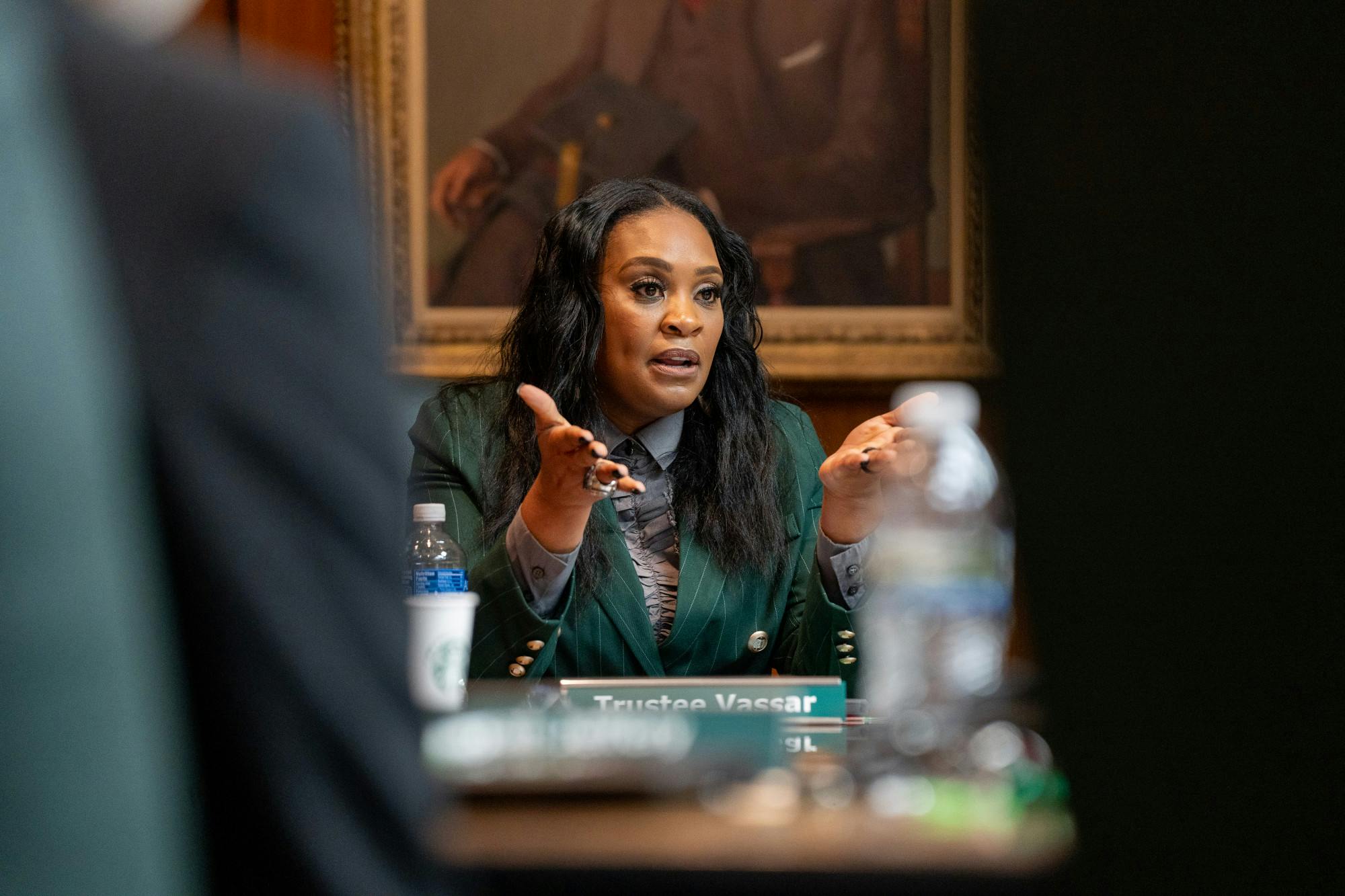
Aside from the trustees themselves, trustee races were primarily funded by Michigan unions and individuals. Unions tended to give between $1,000 to $5,000; the average contributions from individuals were a few hundred dollars with some notable exceptions.
The United Auto Workers made major donations to every Democrat on the board. Progressive members also solicited large contributions from the Michigan Education Association and AFT Michigan, a union representing MSU’s non-tenure professors.
Candidates also raised from individuals. Many collected donations larger than $1,000 from family members, while other supporters usually gave between $100 to $500.
Scott’s largest donor was Orville Crain, a now-deceased Muskegon businessman, and inventor of the Klever Kutter, who gave $2,442.
Vassar’s largest individual donor was Robert Skandalaris, an MSU graduate, businessman and record-setting donor to the university. He donated $1,500 to Vassar’s campaign in December 2020 about one month after she was elected to the board. This was the only donation she received at that time.
“I met with him during the campaign, before the election, but his check came after,” Vassar said.
Political Action Committees, or PACs, occasionally fund candidates. Scott had the most PAC support, with donations from the Black Women’s Caucus and Progressive Women’s Caucus.
The only large donation to O’Keefe’s campaign was a $2,000 contribution from Agri-PAC, the political action committee of the Michigan Farm Bureau.
Foster raised the most from individual donors, with most of her contributions coming from executives at Michigan contracting firms, a group not disproportionately present with any other trustee. These donors included the three contractors awarded the largest contracts by MSU since 2018.
Specifically, executives at The Christman Company, Clark Construction CO and Granger Construction – companies which have been awarded $272 million in MSU contracts since 2018 – gave $2,000, $1,150 and $150 to her campaign, respectively, at her record-setting Adiamos fundraiser in 2014.
The Board of Trustees does not select vendors or contractors, but they do approve agreements with contractors and authorize new projects. Foster denied a request for an interview.
“I have not accepted campaign contributions in 8 years, so vaguely recall who my donors were. I forged many relationships with contractors when I had my company,” Foster said in a text message.
Foster served as the owner of Reinhold Landscape from 1977 to 1997, a large Michigan-based contracting company.
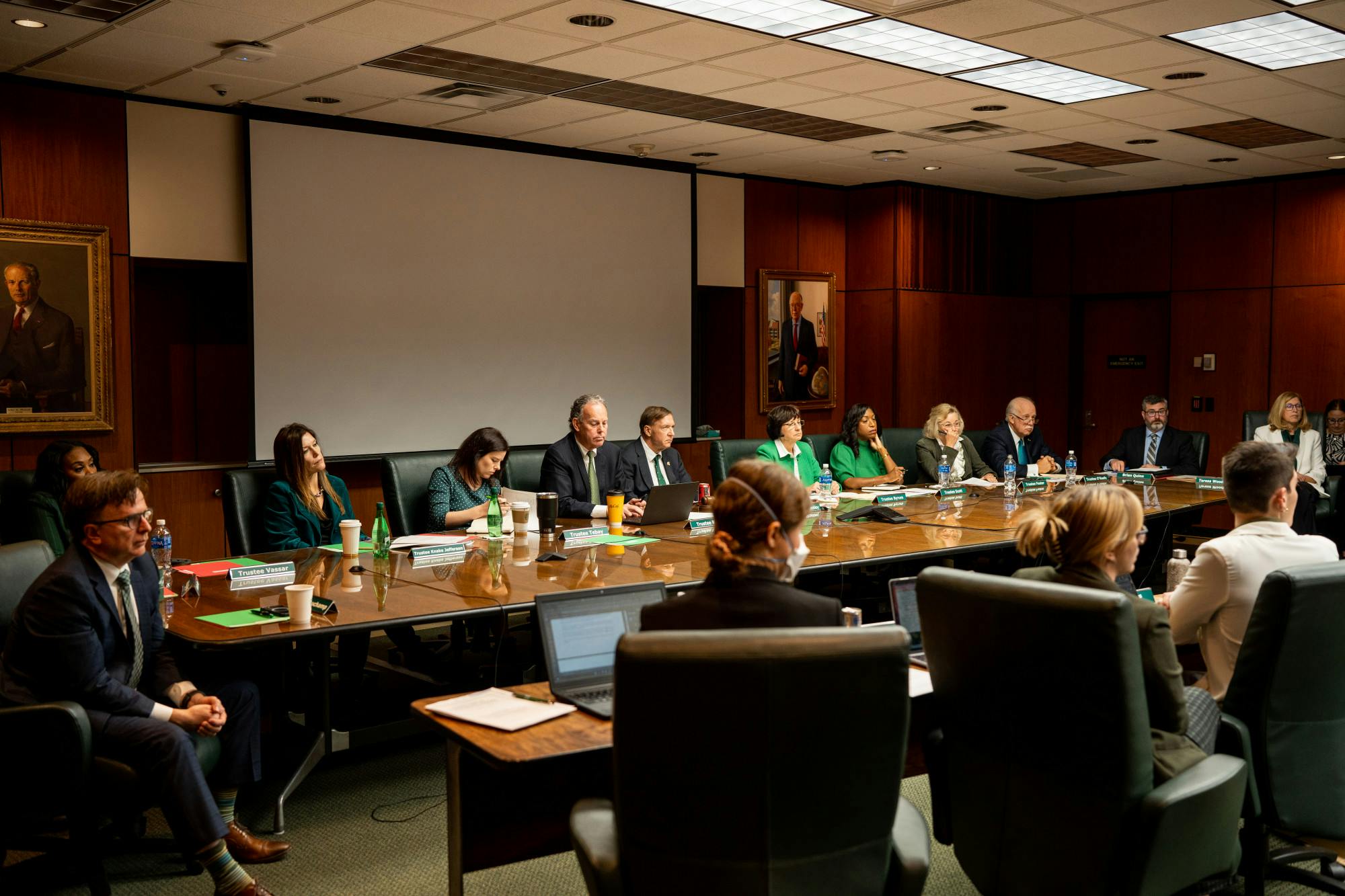
Campaign finance experts interviewed by The State News said that “freer, fairer” elections could be achieved, with public funding for down-ballot races like the trustees.
Patrick Llewellyn, the director of campaign finance at the Campaign Legal Center, wrote in an email to The State News that lesser-known races like the trustee race can be exclusive, only being achievable for wealthy individuals or those with access to a network of wealthy donors.
He sees publicly funded elections as a solution.
Daniel G. Newman, author of "Unrig: How to Fix Our Broken Democracy," said in an email to The State News that “some places like the state of Maine and the city of Seattle provide public funding of election campaigns. Candidates in those places can run for office and have the campaign money it takes to compete, without being dependent on connections to special interests or being wealthy themselves.”


